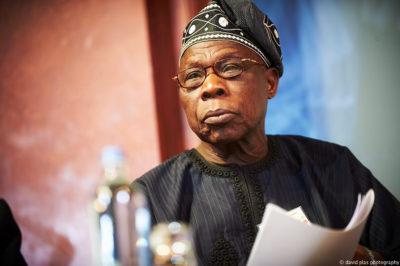There is an undeniable irony in former President Olusegun Obasanjo’s transformation from a leader who bristled at criticism during his tenure to one who now delivers it with reckless abandon. In a nation still grappling with the complexities of governance, Obasanjo’s penchant for incendiary public commentary has become a recurring spectacle that is simply mind-boggling. While elder statesmen worldwide often embody wisdom, restraint, and unity, Obasanjo seems increasingly inclined to wade into Nigeria’s turbulent political waters, casting banal, vituperative aspersions, ornamented with inflammatory grandiloquence that threaten to heat up the polity. His most recent outbursts have once again brought him into the spotlight, not as a respected former leader guiding the nation’s progress, but as a divisive figure just running his mouth and fueling discord.
This behavior is deeply troubling, especially given Obasanjo’s track record as a two-time leader of Nigeria. His criticisms of his successors, while occasionally valid, are often delivered with a tone and timing that appear more self-serving than patriotic. Worse still, they lack the moral weight of a man whose record in office was beyond reproach. The truth is, Obasanjo’s tenure as both military head of state (1976–1979) and civilian president (1999–2007) was riddled with controversies that should compel him to reflect more humbly before casting stones at those who came after him.
Obasanjo’s frequent public admonishments of Nigeria’s leaders hinge on the premise that he himself was a paragon of democracy and good governance. Yet, a cursory glance at his own record reveals a legacy far from exemplary. Under his civilian administration, Nigeria experienced endemic corruption that permeated all levels of government. Despite initiating economic reforms and implementing debt relief, the gains were overshadowed by widespread allegations of graft within his government. Anti-graft institutions tasked with fighting corruption, such as the Economic and Financial Crimes Commission (EFCC), were weaponized against political opponents rather than serving the nation impartially. Furthermore, Obasanjo’s infamous third-term agenda stand as a stark reminder of his own staunch undemocratic credentials. His attempt to amend the Constitution to extend his tenure was met with widespread condemnation and ultimately failed, but it exposed a troubling thirst for power unbecoming of a democratic leader. These missteps alone should dissuade him from adopting the moral high ground when critiquing his successors.
Obasanjo’s sharp tongue has done little to help Nigeria navigate its many challenges. By using his platform to launch blistering attacks on sitting presidents and other public officials, he exacerbates tensions in an already polarized society. His statements are often crafted to stoke outrage rather than foster constructive dialogue, and they risk destabilizing the fragile political equilibrium. For instance, his recent critique of President Bola Tinubu’s administration, though ostensibly aimed at ensuring accountability, lacked the nuance and decorum expected of a statesman. Instead, it came across as an attempt to incite public discontent. At a time when Nigeria faces daunting economic and security challenges, such rhetoric can easily spiral into chaos, emboldening agitators and undermining the government’s ability to govern effectively.
Elder statesmen have an important role to play in national development, but their interventions must be measured and constructive. South Africa’s Nelson Mandela and Ghana’s Jerry Rawlings, despite their imperfections, exemplified how former leaders can guide their nations without descending into pettiness or vindictiveness. Rather than tearing down his successors, Obasanjo could use his platform to advocate for meaningful reforms, mentor the next generation of leaders, and champion unity in diversity. His vast experience—both successes and failures—should position him as a source of wisdom rather than division. Unfortunately, his current approach suggests a man more interested in preserving his relevance than promoting Nigeria’s collective good.
It is difficult to ignore the suspicion that Obasanjo’s frequent attacks on his successors are, in part, a strategy to deflect attention from his own failures. By loudly pointing fingers at others, he conveniently redirects public scrutiny away from his controversial tenure. Obasanjo’s agricultural policies, heralded as transformative during his presidency, fell short of delivering the promised benefits to Nigeria’s rural poor. Similarly, his privatization program, intended to reinvigorate the economy, was marred by cronyism and mismanagement. These failings, combined with his administration’s inability to decisively address Nigeria’s power crisis, suggest a mixed legacy at best.
Nigeria’s path to progress requires collaboration and constructive engagement from all stakeholders, including former leaders. Criticism, when offered in good faith, can spur positive change. However, Obasanjo’s penchant for public grandstanding often undermines the credibility of his critiques. By framing his interventions as attacks rather than solutions, he risks alienating the very people he claims to want to influence. What Nigeria needs from its elder statesmen is a unifying voice that transcends partisan politics and personal grievances. Obasanjo has a unique opportunity to play this role, but only if he sets aside his apparent desire for the limelight and adopts a more conciliatory and solution-oriented approach.
Olusegun Obasanjo’s contributions to Nigeria’s history are undeniable, but his recent actions threaten to overshadow his legacy. His criticisms of his successors, while occasionally valid, are too often delivered in a manner that inflames rather than heals. Nigeria deserves better from a man who has twice had the privilege of leading it. As an elder statesman, Obasanjo has a responsibility to use his voice for good – to inspire hope, foster unity, and promote solutions to the country’s myriad challenges. Loose and inflammatory rhetoric serves no such purpose. It is time for Obasanjo to temper his criticisms with humility, remembering that his own record is far from spotless. Only then can he truly claim the mantle of statesmanship that Nigeria so desperately needs.





